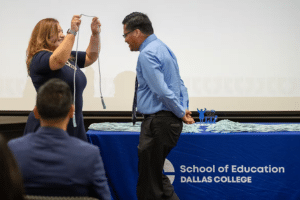12 Jun2023
By Charles A. Barnes II, JD

My research is centered around identity and belonging. Specifically, how Black men identifying as members of the LGBTQIA+ community navigate religious and educational settings firmly rooted in oppressive heteronormative structures. Both religious and educational institutions are built around heteronormative principles that implicitly value and presuppose heterosexuality. Within heteronormative religious and educational spaces, many are confronted with feelings of isolation and alienation.
The presence of homophobia, racism, and other forms of discrimination fosters a hostile environment that marginalizes and excludes individuals like me. The weight of societal expectations, urging conformity, and the concealment of my true self, have resulted in internal conflict, mental health challenges, and a profound sense of disconnection. Nevertheless, I have refused to allow these obstacles to define me. Instead, I have discovered resilience within myself and actively sought out supportive networks, including LGBTQIA+ student organizations, allies, and inclusive educators who have offered me a vital sense of belonging and understanding.
12 Jun2023
By Nicole Dunn
Opportunities to observe and analyze a variety of educators employing evidenced-based practices is a critical component of quality educator preparation. Those opportunities are made even more valuable when they include insights into behind-the-scenes instructional decision making. That is why AACTE is excited to announce a new partnership with the National Board of Professional Teaching Standards, Inc. (‘NBPTS’ or ‘The National Board’) to offer individual and institutional access to ATLAS (Accomplished Teaching, Learning and Schools) at a reduced cost for new subscribers. ATLAS is a video library that provides video cases and analysis tools of accomplished teaching practices indexed to common teaching and learning frameworks across various classroom settings.
AACTE has already provided webinar resources (Part 1 and Part 2) on how to use ATLAS as a tool and framework for using video resources in teacher preparation, and now AACTE is excited to offer you this tool at a reduced cost for those who register for a new subscription before the end of the year! AACTE members who sign up for a new ATLAS subscription before the end of 2023 will receive a 20% discount on institutional or individual subscriptions. Both institutional and individual subscription options are available for both one- and three-year terms, and those selecting a three-year term will be eligible for the 20% discount.
06 Jun2023
By Christine Gentry

With the crucial need for diverse representation and inclusivity in education, two innovative teachers are making an impact in their fields of teaching. I had the pleasure of working with Linden, a science educator from Boston, and Bill, an English language arts teacher in San Francisco, during their residency years spanning from 2017 to 2020.
In honoring trans/nonbinary educators, I captured our discussions, highlighting key themes on the challenges and opportunities they have faced, as well as how they have both transformed their classrooms into safe and supportive spaces for their students.
06 Jun2023
By AACTE

Be a part of the AACTE 2024 Annual Meeting by submitting a proposal or being a reviewer, and join us in Aurora/Denver, CO, February 16 – 18, under the theme: Ascending the Heights: Propelling the Profession into the Future.
06 Jun2023
By Kaitlyn Brennan
This weekly Washington Update is intended to keep members informed on Capitol Hill activities impacting the educator preparation community. The views expressed in this post do not necessarily reflect the views of AACTE.
Just days before America was expected to reach the debt limit, President Biden signed into law the Fiscal Responsibility Act. The measure passed in the Senate with a 63-36 vote — nearly 24 hours after the House cleared the bill 314-117. The legislation raises the debt ceiling until January 2025 and flat funds fiscal year (FY) 2024 and limits a funding increase for FY 2025 to just 1%. Additionally, the deal changes some SNAP and TANF rules that will limit eligibility for some, rescinds some of the IRS funding provided in the Inflation Reduction Act, ends the pause on student loan repayments at the end of summer, rescinds some unobligated COVID-relief funding and a few other changes.
06 Jun2023
By Weade James
 Congratulations to Blanca Jurado, Holmes Scholar of the Month for May 2023!
Congratulations to Blanca Jurado, Holmes Scholar of the Month for May 2023!
Blanca Jurado is a doctoral student at Texas Woman’s University. She earned her master’s degree in curriculum and instruction from the University of Texas at Arlington and her Bachelor of Science degree in psychology from the University of Phoenix.
06 Jun2023
By TXK Today Staff
This article was originally published by TXK Today.
The T.L.L. Temple Foundation (TLLTF) and the Texas Pioneer Foundation recently awarded a five-year $1,137,835 grant to Texas A&M University – Texarkana (TAMUT) to work on building a teacher pipeline to help address the teacher shortage, a high concern shared by school leaders across the country. While many universities talk about high school recruitment to their teacher program, TAMUT is working to develop the teacher talent pipeline as early as 3rd grade and continuing all the way through earning a college credential or degree. “Effective teachers are critical to ensuring that young people learn,” said Wynn Rosser, TLLTF’s president and chief executive officer. “We need more effective teachers, and this approach is exciting because Texarkana-area youth will be prepared to give back to their community while entering a profession with career potential.”
06 Jun2023
By Emily Tate Sullivan

A student is honored at the May 2023 graduation reception for the Dallas College School of Education.
This article was originally published by EdSurge.
The request came from the students.
Those who were enrolled in — or considering enrolling in — American University’s School of Education said they wanted more classroom experience and more opportunities to practice their craft before being released to do it alone every day to a room full of kids.
Wish granted. Today, and for the last year or so, aspiring educators at American University are required to spend a minimum of 40 hours tutoring students in Washington, D.C. public schools, in addition to completing the long-standing requirement of student teaching for a semester.
“We see now, as students are entering student teaching with this additional experience tutoring, how much stronger they are and how much more prepared they are,” says Ocheze Joseph, director of undergraduate teacher education at the university. “They’re more comfortable in the classroom, more familiar.”
And these students aren’t just getting relevant teaching experience. They’re also getting paid.
05 Jun2023
By AACTE
Are you ready to level up your leadership skills this summer? Join fellow deans, chairs, and department heads at AACTE’s
2023 Leadership Academy in Denver from July 30 to August 3. Don’t miss out on the opportunity to network, learn, and grow within the higher education environment.
05 Jun2023
By Beth Goins
 Beginning this summer, the University of Kentucky College of Education is expanding options for those who want to change careers to teach in the fields of science, technology, engineering, mathematics (STEM) and early childhood.
Beginning this summer, the University of Kentucky College of Education is expanding options for those who want to change careers to teach in the fields of science, technology, engineering, mathematics (STEM) and early childhood.
The Kentucky Professional Education Standards Board’s university-based alternative pathway to certification, known as Option 6, allows qualified teacher candidates to work in a full-time teaching position within a Kentucky school while enrolled in a participating teacher preparation program. Through this option, teacher candidates obtain a temporary provisional certificate valid for one year. The provisional certificate must be renewed each year, up to a total of five years. Upon successful completion of the program, graduates are eligible to apply for a Kentucky teaching certificate.
02 Jun2023
By Weade James
The AACTE Holmes Program supports students who self-identify as racially and ethnically diverse and are pursuing graduate degrees in education at AACTE member institutions.
AACTE is excited to welcome two new Holmes Scholars from Syracuse University.
30 May2023
By AACTE

There is still time to nominate a book for the AACTE 2024 Gloria J. Ladson-Billings Outstanding Book Award. This national award recognizes exemplary books that make a significant contribution to the knowledge base of educator preparation or of teaching and learning with implications for educator preparation. The deadline to submit entries is June 9.
This award is named after renowned scholar, Gloria J. Ladson-Billings, whose work has shaped the field in many ways, and her research in cultural pedagogy and equity in educator and student instruction, including critical race theory, has transcended beyond educator preparation. The award-winning book and its author/editor(s) will be recognized at AACTE’s 2024 Annual Meeting, February 16 -18 at the Gaylord Rockies in Aurora/Denver, CO.
30 May2023
By Kaitlyn Brennan
The “In the States” feature by Kaitlyn Brennan is a weekly update to keep members informed on state-level activities impacting the education and educator preparation community.
Last week, North Carolina Governor Roy Cooper declared a state of emergency for public education for the state of North Carolina in a video address to constituents. The Governor pointed to teacher salary, respect of the profession, and the expansion of private school vouchers as key issues that are “aiming to choke the life out of public education.”
North Carolina’s state legislature is led by a Republican majority. In the Senate’s budget proposal, teachers across the state would see a 4.5% raise over the next two years while the House had suggested a 10.2% raise for teachers. The Governor for his part had pushed for an 18% salary increase for educators.
“The Senate has given veteran teachers a $250 raise spread over two years…that’s a slap in the face and will make our teacher shortage worse,” said Governor Cooper.
Additional concerns presented by the Governor throughout his video address include:
- 5,000 teacher vacancies that need to be breached, which is where he said the average pay raises exacerbated the problem. Senators have touted raising the starting pay level significantly to address the need to recruit and an investment in educational programs for teachers.
- The need to invest in early childhood education, about which he said lawmakers were “turning their backs on children, parents, and the businesses that want to hire those parents.” Lawmakers have included some funding for childcare assistance in their budgets.
- The “political culture wars” that he said would put “politicians in charge of curriculum-setting, micromanage what teachers can teach, and target LGBTQ+ students.” He mentioned the elimination of some science classes and the restructuring of history curricula.
All of this comes as Congress left town for the holiday weekend without having struck a deal surrounding the debt limit. As you will recall, last month, House Republicans passed a bill that ties the debt limit to appropriations by raising the debt ceiling by $1.5 trillion or through the end of next March, whichever happens first, in exchange for a wide range of proposals to decrease government funding. The cuts to federal funding would include capping federal funding at fiscal year (FY) 2022 levels — a nearly 22% cut to non-defense discretionary programs (i.e. education) — while also limiting spending growth to 1% every year over the next decade. According the Department of Education, under the proposal the potential cuts would mean the following for North Carolina’s students and teachers:
- Gut Funding for Low-Income Students. The proposal would cut approximately $12 million in Title I funding for North Dakota schools serving low-income children, impacting an estimated 40,000 students and reducing program funding to its lowest level in almost a decade — a cut equivalent to removing nearly 200 teachers and specialized instructional support personnel from classrooms.
- Cut Support for Students with Disabilities. Under the proposal, as many as 17,000 children in North Dakota with disabilities would face reduced supports — a cut in IDEA funding equivalent to removing approximately 100 teachers and related services providers from the classroom.
- Slash Mental Health Support for Students. The House Republican proposal would limit educators’ abilities to address student mental health issues, including through violence, suicide, and drug abuse prevention, by cutting Title IV, Part A funding for North Dakota schools by about $1.5 million.
30 May2023
By AACTE
 Educator preparation advocates play a vital role in advancing the advocacy agenda and supporting those who will teach future generations. Don’t miss this final opportunity to join teacher educators, scholars, and other members from colleges and institutions on June 4 to 7 for AACTE’s 2023 Washington Week, emphasizing the crucial theme of “Investing in Education.”
Educator preparation advocates play a vital role in advancing the advocacy agenda and supporting those who will teach future generations. Don’t miss this final opportunity to join teacher educators, scholars, and other members from colleges and institutions on June 4 to 7 for AACTE’s 2023 Washington Week, emphasizing the crucial theme of “Investing in Education.”
Registration for AACTE’s leading legislative conference ends on May 31 — secure your spot today to join forces with change-makers in the educator preparation field.
29 May2023
By Tony Pals and Marla Koenigsknecht
Leslie T. Fenwick, dean emerita of the Howard University School of Education, where she is a professor of educational policy and leadership, and dean in residence at AACTE, has been selected by the American Educational Research Association (AERA) to present the 2023 Brown Lecture in Education Research. This public lecture will take place on Thursday, October 19, 6:00 – 7:30 p.m. ET, at the Ronald Reagan Building and International Trade Center in Washington, D.C.
Fenwick is a nationally known scholar with deep expertise in public policy, educational equity, and leadership and leadership studies. She is author of the award-winning book Jim Crow’s Pink Slip: The Untold Story of Black Principal and Teacher Leadership (Harvard Education Press), which was released in 2022 and has been referenced by The New York Times, NPR, the Washington Post, Politico, and Education Week. Fenwick is also a section editor of the Handbook of Research on Teachers of Color and Indigenous Teachers (AERA) and a contributor to the bestselling book The Last Word: The Best Commentary and Controversy in American Education (Education Week Press).




 Congratulations to Blanca Jurado, Holmes Scholar of the Month for May 2023!
Congratulations to Blanca Jurado, Holmes Scholar of the Month for May 2023!

 Beginning
Beginning 
